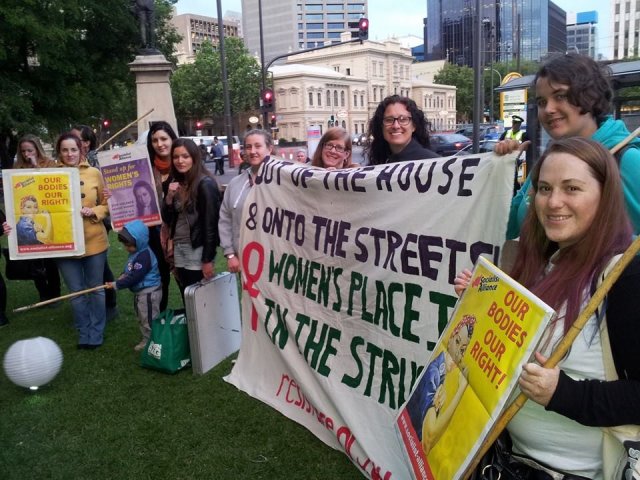
Forty people gathered on the steps of South Australia’s Parliament House on November 27 to protest against a new law that would make it an offence to cause serious harm to a pregnant woman. It was defeated by a single vote.
Introduced by Family First MLC Robert Brokenshire, the bill seeks to introduce "foetal personhood”, with penalties as severe as life in prison for causing what is termed in the bill “the death of the unborn child”.
The bill was sparked by the case of Lisa Smith, who was tragically killed in a car accident while her partner was driving her to hospital seeking emergency assistance for her pregnancy.
The bill would effectively change the status of a person to include an unborn foetus. If a foetus is legally defined as a person it has serious implications for the reproductive rights of women. Legally, foetal personhood laws serve to work as back door ways to encroach on women’s abortion rights by providing legal precedents to challenge terminations, as has been consistently shown in the US.
Abortion is still legally considered a crime under the Criminal Act in South Australia. Greens MLC Tammy Franks said that instead of being forced to mobilise against attacks on abortion rights, people should be fighting for improving legislation on women's reproductive rights.
Addressing parliament during debate over the bill, Franks said: “This bill creates a new crime of conduct that causes serious harm or destruction of an unborn child and extends the existing dangerous driving offences to specifically, in this case, create offences of up to 20 years’ imprisonment for serious harm to an unborn child or up to life imprisonment in the case of the death of an unborn child.
“An ‘unborn child’ is not defined in this bill. An ‘unborn child’ is not defined in the act. We have no definition in this bill of the situations it will cover.”
Dignity for Disability MLC Kelly Vincent said that the best way to protect unborn foetuses is by ensuring women have rights in real terms, while Labor MLC Ian Hunter backed concerns that acknowledge the bill's potential for problematic legal grey areas.
The South Australian foetal personhood bill has similarities with a NSW bill known as Zoe’s Law, which passed through NSW’s lower house last week and has been hailed as a first step for unborn rights by the Australian Christian Lobby (ALC).
This is not the first anti-woman bill Brokenshire has tried to push through South Australian parliament.
Last year, Brokenshire put forward a bill known as Jayden’s Law, which sought to cut the gestation period where miscarriages are classified as stillbirths from 20 weeks to 12, for the purposes of granting a birth certificate or burial rights to miscarriages under 20 weeks, but which potentially implicated personhood rights.
Jayden’s Law was not successful after a strong community campaign headed by the South Australian Feminist Collective.
Like the nature of all foetal personhood bills, the quest to give legal rights to foetuses is attempted through regressive reforms and in incremental steps by openly anti-abortion parties like Family First, attacking women's right to choose while exploiting the tragic losses of women in order to do so.
Sherree Clay, member of Single Parents Action Group, said it was ironic how bills like these claim to protect mothers, while parliament was making the choice of motherhood increasingly untenable for sections of women in society on the back of attacks on single parents and welfare rights.
Brokenshire has pledged that Family First will reintroduce the foetal personhood bill in parliament next year. South Australian Feminist Collective member Nijole Naujokas urged protesters to be ready to mobilise against any future attacks on abortion rights.
Supporters of women’s right to choose must be ready to not only oppose attacks on abortion rights, but actively fight for its decriminalisation and for abortion to be treated as a non-discriminatory health issue. This is essential if we are to achieve free, safe and accessible abortion rights.